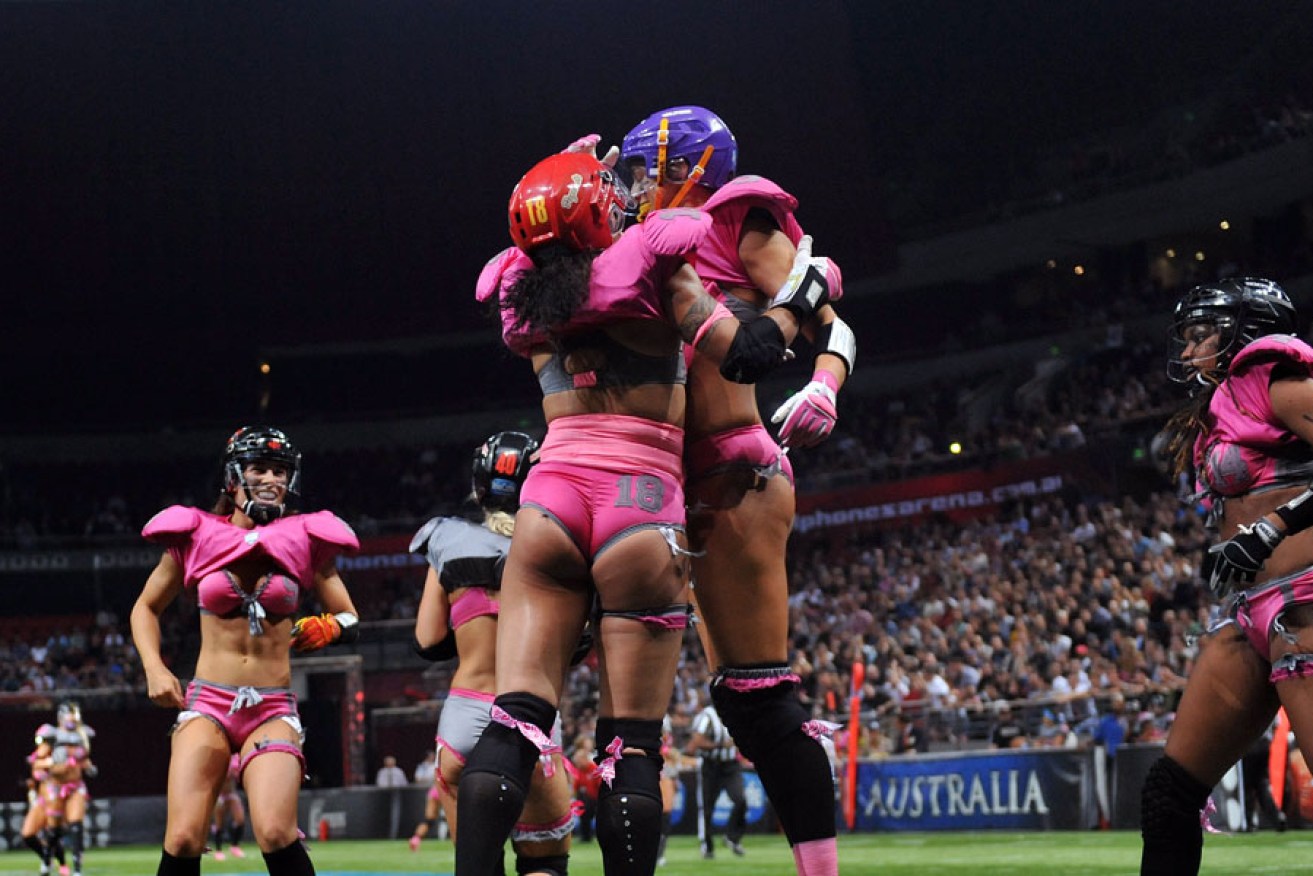Tacky or troubling? ‘Lingerie’ league hits SA


"Lingerie" football players celebrate a touchdown during a demonstration match in Sydney in 2012.
The State Government, not content with underwriting ‘grid girls’ every year on the city’s eastern fringe, is now helping to bring a new low of Benny Hill-style sexual politics to Adelaide’s west.
Lingerie football is coming to town, with the unsubtly named Adelaide Arsenal to call the government-run Coopers Stadium their home from October this year.
This “sport” – now known as the “Legends Football League” in a faux attempt at legitimacy – is based on the rugged game of American football, except this seven-a-side version is played by women in skimpy underwear. They also wear helmets and traditional shoulder pads, which are adjusted to show maximum cleavage.
To watch, the game is ludicrous, surprisingly brutal, not without athleticism. It should be an embarrassment to the players and viewers alike.
It’s a tasteless novelty sport, apparently designed for the kinds of sophisticates who also enjoy the game of “pull my finger”, and who shake their heads at the thought that Adam Sandler has never won an Oscar.
And to those who argue it’s actually a legitimate sport, yesterday’s call by the LFL organisers for SA women to “try out” for the team reveals all. Potential Arsenal team members require no previous experience in gridiron, despite the season beginning in just a few months. Oh – and you also need to bring a photo of yourself in a “two piece”.
We could debate whether the LFL represents a dangerous new low in the objectification of women, or whether it’s merely tacky, as others have argued.
Sadly, though, there’s a bigger issue. This confected entertainment – designed purely for titillation through a piquant combo of sex and violence – is a logical extension of the dodgy marketing history of legitimate women’s sports and their battle for attention and audiences.
Australia’s women basketballers – far more successful internationally than the males – once played their game in what were, essentially, underpants.
Women’s sport has been caught in a chicken and egg conundrum, where a lack of media coverage or recognition (at the rebuilt Adelaide Oval, for example, as Angela Pippos noted last week) is justified by a lack of audience for the sport. The rejoinder is that recognition and coverage will build audience, and around and around we go.
The LFL cuts straight through the debate by starting with a marketing proposition and building from there. In its first season it was “the only female sport on a free-to-air network (Seven Network’s – 7Mate) in high-definition and broadcast in primetime”.
But let’s not get too high and mighty. After all, the controllers of legitimate women’s sports have attempted for decades to use sexuality in order to gain an audience.
Australia’s women basketballers – far more successful internationally than the males – once played their game in what were, essentially, underpants. Footage of elite women’s basketball in the 1980s is baffling to modern eyes – it looks like they simply forgot to put on their shorts (much like many international women’s volleyball teams still today). Then they moved to the “bodysuit” era, where all-time greats like Lauren Jackson were forced to play in ridiculous skintight one-piece costumes in order to gain a “marketing edge”. Simply embarrassing – and thankfully an era that is over.
Beach volleyball is still gripped by the belief that the sport won’t survive without the attraction of skimpy bikinis. At least that “uniform” is in some sort of vague context, although it is mandated for only one reason – the titillation of the audience and therefore greater marketability. The men wear loose-fitting shorts and singlets.
You could argue, I suppose, that the LFL is the natural and honest extension of this unedifying phenomenon – an entertainment that pretends to be nothing else but cheap exploitation, rather than a legitimate athletic endeavor desperately vying for attention.
As writer Helen Razer has pointed out, there is a degree of snobbishness at play over the sneering at the LFL. Another relatively recently confected “sport”, Roller Derby, has been presented as “empowerment”, although the exclusively female players wear what verges on fetish gear. What’s the difference? Attitude? Socio-economic demographic? You tell me (comments welcome below).
Tennis is one sport that seems to be doing things reasonably well, at least relative to other sports.
Women’s tennis is televised in tandem with the men’s competitions. Prize money is (mostly) equal; ratings are good for both. Women don’t have to wear revealing clothing or conform to model-agency specifications to gain attention (although the media does get breathless about certain players). There’s still a long way to go, but tennis is a feminist nirvana compared to many other sports.
The issue of women’s sport and its under-recognition is on the agenda of some politicians and policy-makers, including here in SA.
Which brings me to the government’s involvement in all this – a government which remains nervously silent in the face of questions about the message sent by grid girls at the heavily taxpayer-underwritten Clipsal 500.
Coopers Stadium is run by the state-owned Adelaide Entertainment Centre – a management structure imposed by the government last year in an attempt to make the soccer ground more profitable.
More use of the expensive Hindmarsh arena is welcome, but did anyone think for a moment about whether the LFL was an appropriate tenant and where the line of public interest might be drawn?
I await the announcement of the world jelly wrestling championships to be hosted on the revamped Festival Plaza.




